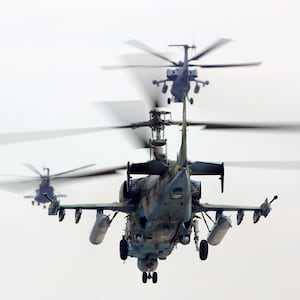KOMRAT, Moldova—Russian pop music was playing at the Augusto Café in the Gagauzia region of Moldova, where four local schoolteachers were meeting up for coffee. They chatted about the latest headlines gripping the country: skyrocketing inflation; recent bomb threats to public buildings, and Russian attacks on the Ukrainian city of Odesa, which is just over a three-hour drive from the coffee shop.
But when they got to the biggest news story that’s come out of Moldova in recent weeks—that the country could be Russia’s next target after Ukraine—the teachers seemed more excited than terrified about the prospect.
“That would be great,” one of the teachers, 36-year-old Anzhela, told The Daily Beast. “Maybe then Russian gas will be cheaper for us.”
The European Union granted Moldova, a country of 2.6 million people, candidate status in June. But the closer Moldova aligns to the West, the more dangerously pro-Russian regions like Gagauzia bubble with separatist ideas. This at a time when the Kremlin’s key propagandist, Vladimir Solovyev, announced on live television that Russia’s plan in southern Ukraine was to “reach Transnistria,” the breakaway territory of Moldova.
“If Russia attacks us, what shall we do? Will we send the army to defend us with a hoe?,” Moldovan President Mayu Sandu warned last week. “We do not want to become involved in the war, but it is a reality for which we need to be ready.”

Maia Sandu and Volodymyr Zelensky.
Hennadii Minchenko/Ukrinform/Future Publishing via GettyThe most influential leader of the country's pro-Russia movement is former president and opposition leader Igor Dodon, a man so loyal to Vladimir Putin that he’s earned nicknames like “Putin’s mini-me,” and “the czar’s doormat.” As president, he went so far as to say Moldova is in need of a “patriot” like Vladimir Putin. The Russian leader, on the other hand, seems perfectly aware of Dodon’s affinity toward him: he once publicly suggested that the Moldovan politician was his personal jester.
Dodon, who lost to Sandu in Moldova’s 2020 elections, has been an ardent defender of the Kremlin’s agenda since the early days of the war in Ukraine. On Russia’s May 9 Victory Day celebrations, he organized protests against the formal ban of the St. George ribbon, a black-and-orange symbol of the Russian military, as well as the letters Z and V, which President Sandu described as “symbols of war and aggression” in Ukraine.
On that day, Dodon and at least a few hundred other politicians, including a dozen or so members of parliament, decorated themselves with the banned ribbons and marched to the Victory Memorial and Eternal Flame park in Moldova’s capital city of Chisinau with thousands of other demonstrators.

Putin and Igor Dodon in 2017.
Mikhail Svetlov/GettySeveral weeks later, a Moldovan court arrested Dodon on high treason and corruption charges. But even now, under house arrest, Dodon continues to post pro-Russian and anti-Sandu statements to his massive following on Telegram. “The ruling party does not deserve its mandate and must be overthrown, in order to organize early elections and return to normal life and stable economic development in Moldova,” he wrote earlier this month. His posts have prompted Dodon supporters to protest in the city’s central square, where hundreds have continued to gather demanding change with chants like, “Sandu out! Moldova wants a new life!”
In Gagauzia, local authorities are now threatening President Sandu with an ultimatum. “We were against the integration with the European Union, so we sent a very clear reminder to our authorities the other day that if they allow Moldova to integrate with the EU and lose independence, we will reach out to friendly countries for justice, including Turkey and Russia,” Moldovan parliament member Georgy Leichu told The Daily Beast on Wednesday. “Of course we sympathize with Russia, we see Putin as a strong leader and Transnistria sympathizes with him. It would not take long to start a protest movement and overthrow Sandu. Our people want to join Russia, but on the same conditions as in the Soviet Union, as an equal member.”
Leichu is a fan of Putin despite the vicious, nearly five-month war that has destroyed dozens of Ukrainian cities and killed thousands of civilians. “A majority of Moldovans like Putin more than all other post-Soviet leaders because he is strong, he is winning, it’s easier for people to understand what he wants,” Leichu said. “Our recent problems with Russia started after President Sandu decided not to travel to Moscow and meet with Putin. The inflation is already 32 percent and Sandu fails to explain to our public why life without Russia and as an ally of the European Union would be better.”
If approval ratings are any indication, the threat to Sandhu’s authority is growing by the day. According to IData, Sandu’s ruling Party of Action and Solidarity has 22.6 percent of the public’s support, while the pro-Russian bloc of Dodon’s Party of Socialists and Party of Communists is at 26.3 percent.
Another passionate Dodon ally who spoke with The Daily Beast, parliament member Bogdan Tsyrdea, warned that “social unrest and explosive street protests” were coming for Moldova. “Police detained Dodon on Sandu’s birthday, on May 24,” Tsyrdea fumed, while smoking a cigarette. “This is nonsense. Sandu turned Moldova into a colony of the United Kingdom and America.”

Igor Dodon.
Vladislav Culiomza/ReutersBack at Agusto Café, the school teachers had a much simpler justification for their embrace of Russia and Vladimir Putin. They complained of low incomes, and how they couldn’t understand how they personally benefited from pro-Western politics.
“We speak Russian, we teach at school in Russian, we all have relatives in Russia, while under this government, we already have 30 percent of inflation, more than in the war-torn Ukraine. Our salaries are nuts!” the oldest of the teachers in the group, 62-year- old Tatiana, told The Daily Beast. “If Putin takes over, we’ll have decent lives.”






